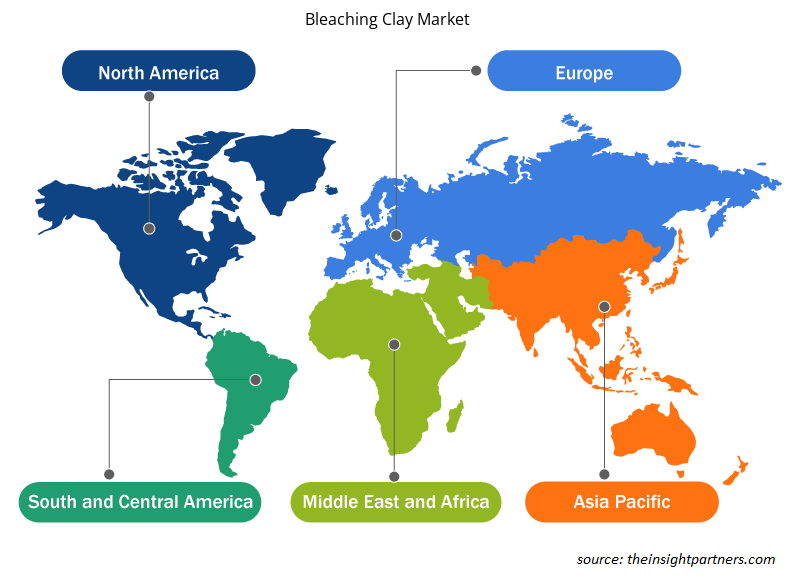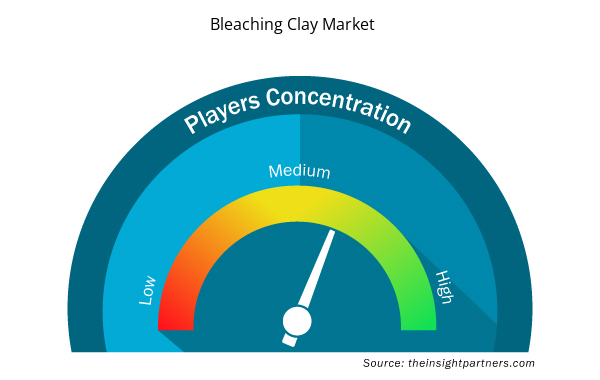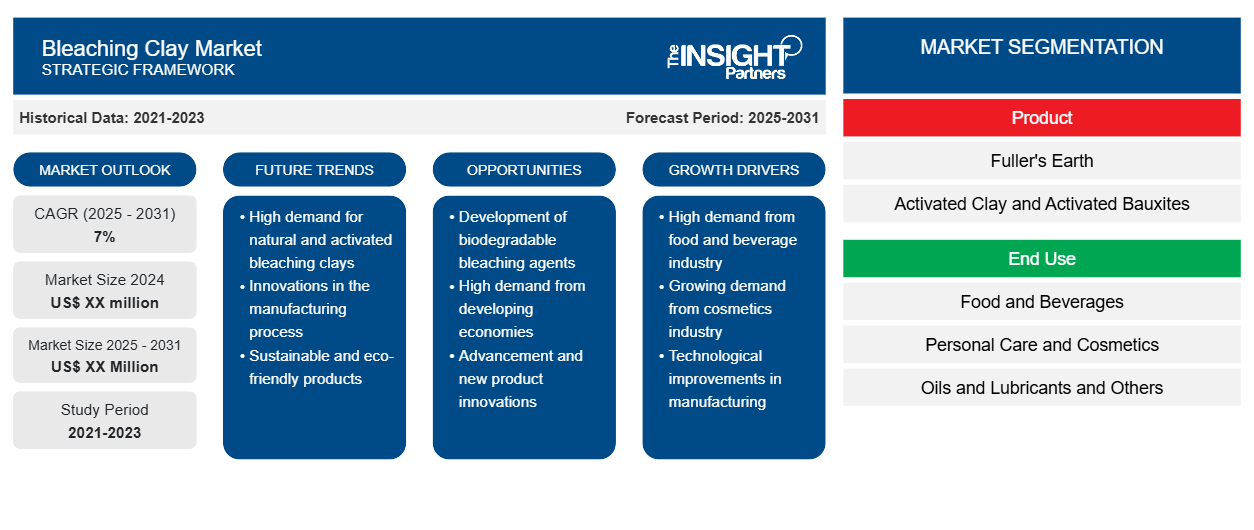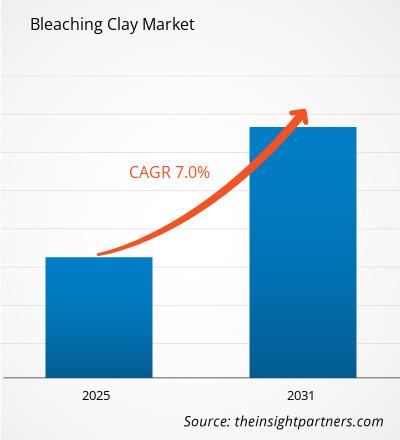漂白粘土市場規模は、2023年の13億8,000万米ドルから2031年には22億4,000万米ドルに達すると予測されています。市場は2023年から2031年の間に6.2%のCAGRを記録すると予想されています。再生可能燃料の精製に対する需要の高まりは、漂白粘土市場に新たな重要なトレンドをもたらす可能性があります。
漂白粘土市場分析
天然オイルは、肌に潤いを与えるために化粧品によく配合されます。しかし、これらのオイルには、化粧品の配合に悪影響を与える可能性のある不純物や色素が含まれている場合があります。そのため、漂白粘土は天然オイルとワックスを精製するための主要成分として使用されます。漂白粘土は、不純物を除去する優れた吸着特性を持っています。厳格な品質基準を順守するために、高級スキンケアおよび美容ブランドは、製品の製造において精製プロセスを義務付けています。さらに、消費者の好みが自然で持続可能な美容ソリューションへと移行したため、化粧品配合における高品質で精製された成分の需要が高まっています。したがって、パーソナルケアおよび化粧品部門のメーカーは、持続可能な慣行を選択する傾向が高まっており、そのため漂白粘土が需要を満たすために広く好まれています。
漂白粘土市場の概要
忙しいライフスタイルと時間的制約により、加工食品や包装食品の需要は世界中で大幅に増加しています。ほとんどの加工食品には、商品の保存期間を延ばすために食用油が含まれています。食用油はこれらの食品の主要成分であるため、漂白粘土は食用油の精製と色の向上に重要な役割を果たします。油の精製とは別に、漂白粘土は品質基準を満たすために化粧品の精製にも使用されます。アジア太平洋諸国では、化粧品に使用される天然オイルの利点に対する認識が高まっているため、スキンケアや美容製品への傾向が高まっています。したがって、前述の要因がアジア太平洋地域の漂白粘土市場の成長を牽引しています。
要件に合わせてレポートをカスタマイズする
このレポートの一部、国レベルの分析、Excelデータパックなど、あらゆるレポートを無料でカスタマイズできます。また、スタートアップや大学向けのお得なオファーや割引もご利用いただけます。
- このレポートの主要な市場動向を入手してください。この無料サンプルには、市場動向から見積もりや予測に至るまでのデータ分析が含まれます。
漂白粘土市場の推進要因と機会
食品・飲料業界における漂白粘土の採用急増が市場を後押し
食用油から加工食品まで、油脂は食品分野で重要な役割を果たしています。しかし、これらの油は、不純物や色素が除去されないと、最終製品の品質や外観に悪影響を及ぼす可能性があります。さらに、消費者が消費する製品の品質にますます注意を払うようになるにつれて、メーカーは食品の純度と美観を確保するプロセスに投資しています。このシナリオにより、油から不要な臭い、色、不純物を取り除くために漂白粘土の使用が促進されました。油の精製に漂白粘土を使用すると、油の見た目が美しくなり、保存期間と安定性が向上します。漂白粘土は、製品の一貫性と寿命に重要な役割を果たします。さらに、漂白粘土の汎用性は、油やさまざまな食品関連の用途を超えて広がっています。食品加工に使用されるワックスやその他の成分の精製に使用されています。漂白粘土の不純物を効果的に除去する能力は、健康志向の消費者の需要を満たすクリーンラベル製品を提供するという業界の取り組みと一致しています。
持続可能な燃料の需要の高まり
持続可能な燃料の需要の高まりは、バイオディーゼルやその他の再生可能エネルギー源の生産における効果的な精製ソリューションの必要性に牽引され、漂白粘土市場に大きな成長の機会をもたらします。世界中の政府や業界が環境の持続可能性をますます優先し、化石燃料の代替品を模索するにつれて、植物油、動物性脂肪、リサイクルされた食用油などの再生可能な原料から得られるバイオディーゼルの需要が高まっています。漂白粘土は、原料油から不純物や汚染物質を取り除き、最終製品の品質と性能を向上させることで、バイオディーゼルの生産において重要な役割を果たします。精製プロセスでは、バイオディーゼルの安定性、効率、排出プロファイルに悪影響を与える可能性のある色素、遊離脂肪酸、水分、その他の望ましくない物質を吸着します。精製プロセスで漂白粘土を使用することで、バイオディーゼル生産者は厳格な品質基準に準拠し、事業全体の持続可能性を高めることができます。
漂白粘土市場レポートのセグメンテーション分析
漂白粘土市場分析の導出に貢献した主要なセグメントは、製品と最終用途です。
- 製品に基づいて、漂白粘土市場は、フラー土、活性粘土、活性ボーキサイトに分類されます。活性ボーキサイトセグメントは、2023年に最大の市場シェアを占めました。
- 最終用途別に見ると、市場は食品・飲料、パーソナルケア・化粧品、オイル・潤滑剤、その他に分類されます。食品・飲料部門は2023年に最大の市場シェアを占めました。
地域別漂白粘土市場シェア分析
漂白粘土市場レポートの地理的範囲は、主に北米、アジア太平洋、ヨーロッパ、中東およびアフリカ、南米および中米の 5 つの地域に分かれています。
アジア太平洋地域が市場を独占しています。加工食品や包装食品の消費が増え続ける中、高品質の食用油の需要が高まっています。漂白土は精製プロセスで重要な役割を果たし、不純物や望ましくない色を取り除き、最終的な食用油が業界が定める厳格な品質基準を満たすようにします。さらに、アジア太平洋地域の医薬品および化粧品業界も漂白土の需要に貢献しています。医薬品や化粧品に使用される油やワックスの精製は、厳格な規制要件を満たし、高品質の製品の製造を保証するために不可欠です。漂白土は、これらの精製基準を達成するための信頼できる手段として機能します。業界が製品の品質、環境の持続可能性、革新を優先し続けるため、漂白土の需要は今後数年間上昇傾向を維持すると予想され、アジア太平洋地域は業界にとって重要な成長市場になります。
漂白粘土市場の地域別分析
予測期間を通じて漂白粘土市場に影響を与える地域的な傾向と要因は、Insight Partners のアナリストによって徹底的に説明されています。このセクションでは、北米、ヨーロッパ、アジア太平洋、中東、アフリカ、南米、中米にわたる漂白粘土市場のセグメントと地理についても説明します。

- 漂白粘土市場の地域別データを入手
漂白粘土市場レポートの範囲
| レポート属性 | 詳細 |
|---|---|
| 2023年の市場規模 | XX百万米ドル |
| 2031年までの市場規模 | XX百万米ドル |
| 世界のCAGR(2023年~2031年) | 7% |
| 履歴データ | 2021-2022 |
| 予測期間 | 2024-2031 |
| 対象セグメント | 製品別
|
| 対象地域と国 | 北米
|
| 市場リーダーと主要企業プロフィール |
|
漂白粘土市場のプレーヤー密度:ビジネスダイナミクスへの影響を理解する
漂白粘土市場は、消費者の嗜好の変化、技術の進歩、製品の利点に対する認識の高まりなどの要因により、エンドユーザーの需要が高まり、急速に成長しています。需要が高まるにつれて、企業は提供を拡大し、消費者のニーズを満たすために革新し、新たなトレンドを活用し、市場の成長をさらに促進しています。
市場プレーヤー密度とは、特定の市場または業界内で活動している企業または会社の分布を指します。これは、特定の市場スペースに、その市場規模または総市場価値に対してどれだけの競合相手 (市場プレーヤー) が存在するかを示します。
漂白粘土市場で事業を展開している主要企業は次のとおりです。
- クラリアントインターナショナル株式会社
- EPエンジニアードクレイズコーポレーション
- HRPインダストリーズ
- ムシムマスグループ
- アシャプラ・パーフォクレイ・リミテッド
- タイコクレイマーケティング株式会社
免責事項:上記の企業は、特定の順序でランク付けされていません。

- 漂白粘土市場のトップキープレーヤーの概要を入手
漂白粘土市場のニュースと最近の動向
漂白粘土市場は、主要な企業出版物、協会データ、データベースなどの一次調査と二次調査後の定性的および定量的データを収集することによって評価されます。漂白粘土市場の動向のいくつかを以下に示します。
- シェル社(シェル)の完全子会社であるシェル・イースタン・ペトロリアム社(Pte)は、廃油リサイクル会社エコオイルズ社(エコオイルズ)を買収したと発表した。この買収は、持続可能な航空燃料を含む輸送用の持続可能な低炭素燃料の生産を増やすというシェルの野心の一環である。(出典:シェル社、企業ウェブサイト、2022年)
漂白粘土市場レポートのカバー範囲と成果物
「漂白粘土市場の規模と予測(2021〜2031年)」レポートでは、以下の分野をカバーする市場の詳細な分析を提供しています。
- 漂白粘土市場の規模と予測(対象範囲に含まれるすべての主要市場セグメントの世界、地域、国レベル)
- 漂白粘土市場の動向、推進要因、制約、主要な機会などの市場動向
- 詳細なPEST/ポーターの5つの力とSWOT分析
- 主要な市場動向、世界および、主要プレーヤー、規制、最近の市場動向を網羅した漂白粘土市場分析
- 漂白粘土市場の市場集中、ヒートマップ分析、主要プレーヤー、最近の動向を網羅した業界の状況と競争分析
- 詳細な企業プロフィール
- 過去2年間の分析、基準年、CAGRによる予測(7年間)
- PEST分析とSWOT分析
- 市場規模価値/数量 - 世界、地域、国
- 業界と競争環境
- Excel データセット



Report Coverage
Revenue forecast, Company Analysis, Industry landscape, Growth factors, and Trends

Segment Covered
This text is related
to segments covered.

Regional Scope
North America, Europe, Asia Pacific, Middle East & Africa, South & Central America

Country Scope
This text is related
to country scope.
よくある質問
Advanced processing technologies is expected to be the key market trends
Based on geography, Asia Pacific held the largest share of the bleaching clay market due to increasing demand for refined oils and fats across various industries, including food processing and cosmetics
Based on product, the fuller's earth segment is expected to witness the fastest growth during the forecast period
Growing demand of bleaching clay for vegetable oil refining and expansion of cosmetics industry is driving the market growth
BASF SE; AMC; GlobeCore GmbH; Clariant; HRP Industries are some of the key players operating in the bleaching clay market
The Bleaching Clay Market is estimated to witness a CAGR of 7% from 2023 to 2031
Trends and growth analysis reports related to Chemicals and Materials : READ MORE..
The Insight Partners performs research in 4 major stages: Data Collection & Secondary Research, Primary Research, Data Analysis and Data Triangulation & Final Review.
- Data Collection and Secondary Research:
As a market research and consulting firm operating from a decade, we have published and advised several client across the globe. First step for any study will start with an assessment of currently available data and insights from existing reports. Further, historical and current market information is collected from Investor Presentations, Annual Reports, SEC Filings, etc., and other information related to company’s performance and market positioning are gathered from Paid Databases (Factiva, Hoovers, and Reuters) and various other publications available in public domain.
Several associations trade associates, technical forums, institutes, societies and organization are accessed to gain technical as well as market related insights through their publications such as research papers, blogs and press releases related to the studies are referred to get cues about the market. Further, white papers, journals, magazines, and other news articles published in last 3 years are scrutinized and analyzed to understand the current market trends.
- Primary Research:
The primarily interview analysis comprise of data obtained from industry participants interview and answers to survey questions gathered by in-house primary team.
For primary research, interviews are conducted with industry experts/CEOs/Marketing Managers/VPs/Subject Matter Experts from both demand and supply side to get a 360-degree view of the market. The primary team conducts several interviews based on the complexity of the markets to understand the various market trends and dynamics which makes research more credible and precise.
A typical research interview fulfils the following functions:
- Provides first-hand information on the market size, market trends, growth trends, competitive landscape, and outlook
- Validates and strengthens in-house secondary research findings
- Develops the analysis team’s expertise and market understanding
Primary research involves email interactions and telephone interviews for each market, category, segment, and sub-segment across geographies. The participants who typically take part in such a process include, but are not limited to:
- Industry participants: VPs, business development managers, market intelligence managers and national sales managers
- Outside experts: Valuation experts, research analysts and key opinion leaders specializing in the electronics and semiconductor industry.
Below is the breakup of our primary respondents by company, designation, and region:

Once we receive the confirmation from primary research sources or primary respondents, we finalize the base year market estimation and forecast the data as per the macroeconomic and microeconomic factors assessed during data collection.
- Data Analysis:
Once data is validated through both secondary as well as primary respondents, we finalize the market estimations by hypothesis formulation and factor analysis at regional and country level.
- Macro-Economic Factor Analysis:
We analyse macroeconomic indicators such the gross domestic product (GDP), increase in the demand for goods and services across industries, technological advancement, regional economic growth, governmental policies, the influence of COVID-19, PEST analysis, and other aspects. This analysis aids in setting benchmarks for various nations/regions and approximating market splits. Additionally, the general trend of the aforementioned components aid in determining the market's development possibilities.
- Country Level Data:
Various factors that are especially aligned to the country are taken into account to determine the market size for a certain area and country, including the presence of vendors, such as headquarters and offices, the country's GDP, demand patterns, and industry growth. To comprehend the market dynamics for the nation, a number of growth variables, inhibitors, application areas, and current market trends are researched. The aforementioned elements aid in determining the country's overall market's growth potential.
- Company Profile:
The “Table of Contents” is formulated by listing and analyzing more than 25 - 30 companies operating in the market ecosystem across geographies. However, we profile only 10 companies as a standard practice in our syndicate reports. These 10 companies comprise leading, emerging, and regional players. Nonetheless, our analysis is not restricted to the 10 listed companies, we also analyze other companies present in the market to develop a holistic view and understand the prevailing trends. The “Company Profiles” section in the report covers key facts, business description, products & services, financial information, SWOT analysis, and key developments. The financial information presented is extracted from the annual reports and official documents of the publicly listed companies. Upon collecting the information for the sections of respective companies, we verify them via various primary sources and then compile the data in respective company profiles. The company level information helps us in deriving the base number as well as in forecasting the market size.
- Developing Base Number:
Aggregation of sales statistics (2020-2022) and macro-economic factor, and other secondary and primary research insights are utilized to arrive at base number and related market shares for 2022. The data gaps are identified in this step and relevant market data is analyzed, collected from paid primary interviews or databases. On finalizing the base year market size, forecasts are developed on the basis of macro-economic, industry and market growth factors and company level analysis.
- Data Triangulation and Final Review:
The market findings and base year market size calculations are validated from supply as well as demand side. Demand side validations are based on macro-economic factor analysis and benchmarks for respective regions and countries. In case of supply side validations, revenues of major companies are estimated (in case not available) based on industry benchmark, approximate number of employees, product portfolio, and primary interviews revenues are gathered. Further revenue from target product/service segment is assessed to avoid overshooting of market statistics. In case of heavy deviations between supply and demand side values, all thes steps are repeated to achieve synchronization.
We follow an iterative model, wherein we share our research findings with Subject Matter Experts (SME’s) and Key Opinion Leaders (KOLs) until consensus view of the market is not formulated – this model negates any drastic deviation in the opinions of experts. Only validated and universally acceptable research findings are quoted in our reports.
We have important check points that we use to validate our research findings – which we call – data triangulation, where we validate the information, we generate from secondary sources with primary interviews and then we re-validate with our internal data bases and Subject matter experts. This comprehensive model enables us to deliver high quality, reliable data in shortest possible time.


 このレポートの無料サンプルを入手する
このレポートの無料サンプルを入手する